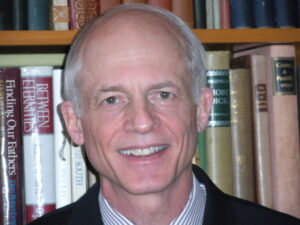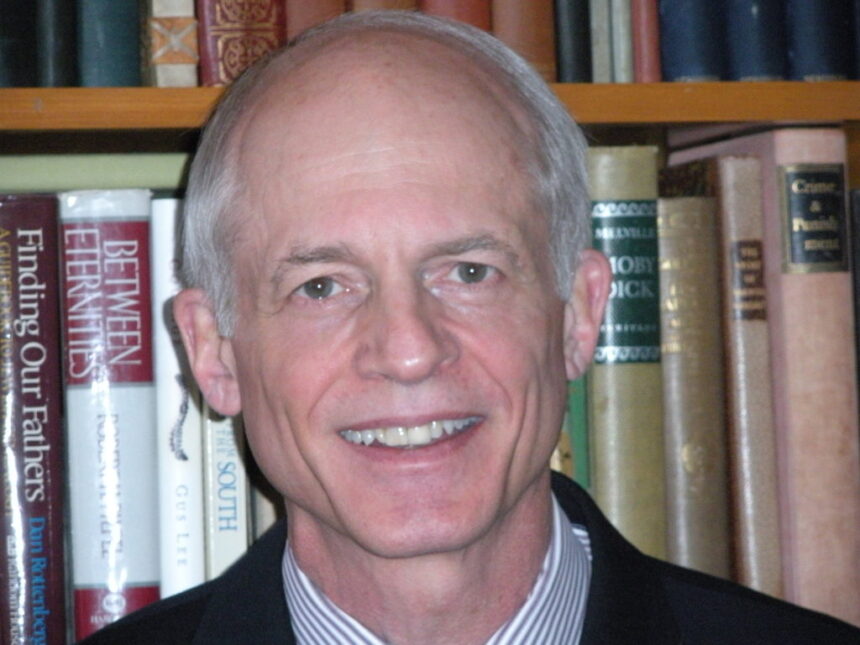
Even when writing a memo, Hillsdale Classics Professor Emeritus Michael Poliakoff uses his classics expertise.
“In the classics major, you are spending time steeped in works that have resonated throughout time, and that’s the best possible preparation for understanding the way human beings interact,” Poliakoff said. “I draw on my classical background just about every day. How often I find Virgil, Aristotle, or Plato talking to me, helping me make decisions!”
After arriving at Hillsdale in 1988 and being delighted by the quality of students and the dedication to the humanities and liberal arts, Poliakoff began his Hillsdale career by founding the classics department. He quickly hired Professor Emeritus Lorna Holmes and began expanding the program.
Despite no reputation and limited staff, Poliakoff and Holmes established a department that now involves more than 10 percent of students. It’s grown in the past 28 years, but Poliakoff’s annual barbecue tradition and the decision to begin all Greek students with Classical Greek rather than Koine — the less inclusive New Testament version — have endured.
Professor of Classics Joseph Garnjobst met Poliakoff at the Sports and Character Center for Constructive Alternatives lecture this year, at which Poliakoff delivered a speech on Ancient Greek Athletics and Competition.
The department began with only a few students, but now graduates 10 to 15 majors every year, many of whom win awards and present papers across the country.
“We could not have done that without them starting it off,” Garnjobst said. I look at Michael as the founding father of the department. It was gratifying to have him here and see the fruits of his labor.”
“There was a new spirit on campus,” Poliakoff said. “Having lunch with the classics students — the articulate conversation and the desire for many of them to be educators — all of them showed me a school that’s very lively.”
His interest in classics developed in his youth, when he learned Hebrew, watched his mother sculpt classical works, and formed a deep appreciation for tradition. Captured by the engaging classics authors, he majored in classics at Yale University and has been working in education ever since.
“What is the value of human life if we don’t pass on from one generation to the next the things we learn, to make the next generation’s experience in life better than ours?” Poliakoff said.
According to the Bureau of Labor statistics, an average person will change careers 11 times between ages 18 and 46. Poliakoff said that a background in Greek or Latin provides an intellectual development that will equip a student for any pursuit.
“We’re in a challenging, dynamic, global marketplace, and the best thing that a student can acquire in a college education is intellectual ability, agility, flexibility,” he said. “These are all the things that come from pursuing a classics major.”
Garnjobst came to a similar conclusion, emphasizing not only classics but the whole liberal arts.
“The classics itself is, in a way, a mini liberal arts,” he said. “You have to have language, but you also have to be able to know about whatever the ancients wrote about. You need something from every one of the departments in order to do the best job you can. That’s why I love working with all my colleagues in other departments. They make me a better classicist.”
John Reist — once Vice President of Acadmic Affairs — pushed for the creation of the classics department, insisting that no liberal arts college was complete without it. Hillsdale College had terminated its classics department in the 1960s due to financial stress, but only temporarily. As schools now continue to dissolve their classics departments, Hillsdale’s only grows.
“When you deal with professors who love what they do and love their subject matter so much, it’s infectious,” Garnjobst said. “And when you put students who are hungry to learn there, it’s a fun combination.”
Holmes made a priority of creating courses that all students — both below and above average — could take and enjoy. She also kept the cordiality of relationships between classics staff members, a characteristic originally created by Poliakoff.
“He’s a very inspiring person to work with,” Holmes said. “He has a positive attitude and is enthusiastic about the things he’s interested in, and he loves working with students. He admires the abilities of students and tries to promote them.”
Poliakoff left Hillsdale at the end of 1990. Since then, he has taught at a number of schools and now works for American Council of Trustees and Alumni, an independent, nonprofit organization committed to academic freedom, excellence, and accountability at America’s colleges and universities.
“In some ways, Hillsdale was successful with me the same way it is successful with all of its students,” he said. “I became much more aware of issues of policy and much more ambitious about being able to address nature issues in education, which can only be done at a policy-making level. I don’t think anyone can be at Hillsdale without becoming more political in a good sense, developing duties of citizenship and obligations to the nation as a whole.”

